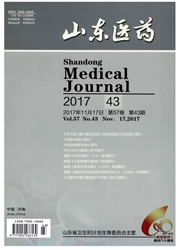

 中文摘要:
中文摘要:
目的探讨无创性胎儿常见染色体非整倍体筛查的应用价值。方法收集5 469例孕妇外周血标本,提取血浆游离DNA进行高通量测序筛查胎儿染色体非整倍体,对21、18、13和性染色体三体高风险者行羊水或脐血穿刺,进行多重定量荧光PCR(QF-PCR)检测和染色体核型分析验证。结果无创筛查出染色体非整倍体高风险样本71例(1.3%),其中21-三体30例(1例为嵌合型)、18-三体7例、13-三体6例、X染色体数量增多11例、X染色体数量减少17例。21、18、13-三体除有5例未做介入性产前诊断,3例为假阳性外,其余均与QF-PCR和核型分析验证结果一致。性染色体阳性结果者经核型分析验证有13例为异常,准确率为46.4%。其余5 398例无创筛查阴性结果者后期经B超监测和电话随访,未发现21、18、13以及性染色体非整倍体患儿。结论无创性胎儿染色体非整倍体筛查技术对21、18、13-三体的检测准确性较高,可以作为传统产前筛查诊断策略的有益补充,但对性染色体非整倍体检测的准确性较低,尚需进一步优化检测和分析方法。
 英文摘要:
英文摘要:
Objective To explore the application value of non-invasive common fetal chromosomal aneuploidy screening. Methods A total of 5 469 maternal peripheral blood samples were collected, and plasma free DNA was extracted for high throughput sequencing to detect fetal chromosomal aneuploidies. Samples with high risk of trisemies 21, 18, 13, X and Y were verified by multiplex quantitative fluorescent PCR (QF-PCR) and karyotype analysis by using amniotic fluid or cord blood. Results After non-invasive prenatal screening, 71 ( 1.3% ) showed positive results, including 30 cases of trisomy 21, 7 cases of trisomy 18, 6 cases of trisomy 13, 11 cases with increased X chromosome, and 17 cases with decreased X chromosome. In trisomies 21, 18 and 13, 5 cases rejected interventional prenatal diagnosis, 3 cases were false positive, and the rest were all consistent with the results of QF-PCR and karyotyping. In positive results of sex chromosome aneuploidies, 13 cases were confirmed abnormal by karyotyping, and the accuracy rate was about 46.4%. The other 5 398 pregnant women with negative screening results were monitored by B ultrasound and were telephoned for follow-up, and none of them were found trisdmies 21, 18, 13, X and Y. Conclusions Non-invasive fetal chromosomal aneuploidy screening can accurately detect trisomies 21, 18 and 13, which can serve as a useful complement to traditional prenatal screening and diagnosis. While the accuracy of sex chromosome aneuploidies detection is low, we still need to further optimize the detection and analysis method.
 同期刊论文项目
同期刊论文项目
 同项目期刊论文
同项目期刊论文
 期刊信息
期刊信息
